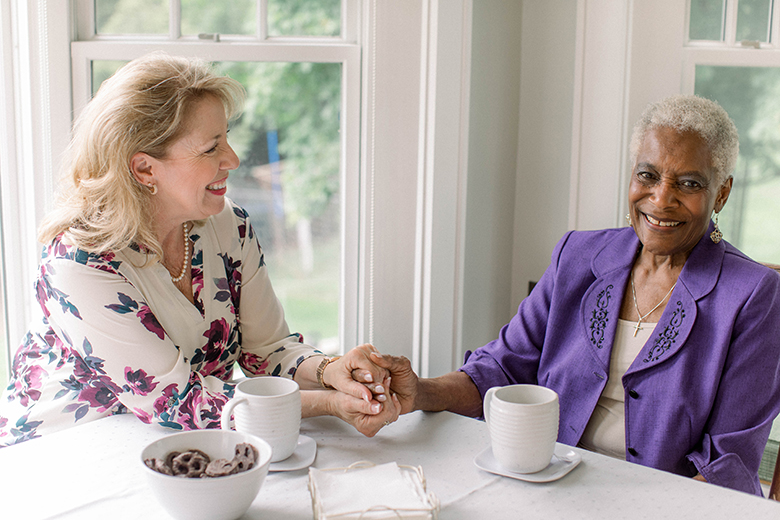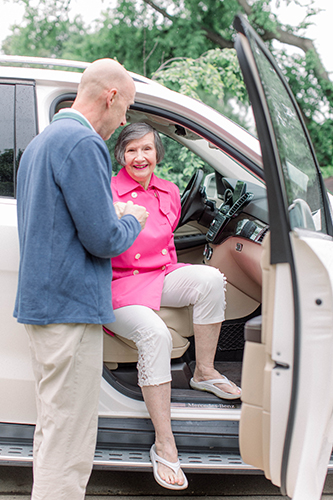Support for Primary Progressive Aphasia: Adapting Daily Routines With Help From a Non-Medical Companion

Do you have a friend or family member diagnosed with Primary Progressive Aphasia (PPA)? If so, you know that PPA is a challenging form of dementia that gradually robs a person of their ability to use and understand language.
For families and friends navigating this diagnosis, the loss of verbal communication is heartbreaking, but the impact on daily life can be just as hard. As your loved one’s ability to communicate declines, maintaining the familiar routines that brought comfort and joy also declines. This can lead to frustration and anxiety for everyone involved.
This is where a compassionate, non-medical companion can make a difference, such as those who represent Joyful Companions. Our non-medical companions can help provide Aphasia support to someone diagnosed with PPA through a more structured, person-centered routine.
This helps foster a sense of security and autonomy, which helps bridge the communication gap and transform a home environment into a place of peace and engagement.
Let’s explore how non-medical companions can provide in-home care for PPA, helping individuals maintain a structured environment through alternative communication methods.
Finding Security Through Routine
When words fail, routine becomes a reliable language with which to communicate. As PPA impairs verbal and cognitive skills, a consistent daily routine provides a predictable framework that reduces confusion and anxiety.
A non-medical companion from Joyful Companions can help in many ways, like:
-
Help establish and maintain consistent schedules where the companion helps the client anticipate what comes next, reducing the need for verbal communication.
-
Help introduce visual aids to support the routine, such as a whiteboard with the morning’s activities in picture form.
By reducing the need for verbal communication, individuals can live a more peaceful life. When the routine is spelled out in an easy-to-understand way, they don’t need to find different ways to communicate.
This can help alleviate the stress and anxiety that comes with being unable to express what they want to say.
Maximizing Comfort & Engagement With Tailored Care
A non-medical companion can adapt to the client’s unique needs, tailoring every aspect of care to maximize comfort and engagement while preserving dignity.

Some ways that non-medical companions can help achieve this are through:
-
Assisting the client with personal care tasks, including dressing and grooming. A companion can lay out the clothes in order and help guide the client through gentle touch and simple gestures.
-
Easing the challenge of mealtimes by providing a consistent time and place for meals and using a calm, unhurried presence to make the client’s experience pleasant and non-stressful.
-
Planning activities by creating meaningful moments. They can help the client with creative outlets, such as painting, drawing, or listening to music.
-
Providing sensory and physical activities helps individuals develop a sense of purpose and connection.
-
Assisting with reminiscence therapy by looking through old photo albums or talking about memories.
Non-Medical Companionship Encourages Compassionate Connections
Joyful Companions teaches our non-medical companions to be compassionate and understanding to every client we work with.
With help from our non-medical companions, your loved one with PPA can feel cared for and have a connection with another individual with family or friends who are otherwise engaged. They can serve as a bridge between the outside world and your loved one, providing emotional support.
Through patience, a positive attitude, and an understanding of PPA, non-medical companions can create a calming and supportive environment where a person can live with a sense of purpose, even as their ability to communicate fades.
Our companions offer families an invaluable gift of peace of mind, knowing their loved one is in the right hands.

Support Your Loved One With Person-Centered PPA Care
If you need in-home care for PPA, reach out to Joyful Companions. Our Twin Cities-based organization is here to help you support your loved one through regularly scheduled visits and round-the-clock care.
We also provide respite care and regular check-ins to give you the peace of mind you need to attend to other life responsibilities.
Give us a call today at 763-544-0401 or request a free consultation online!